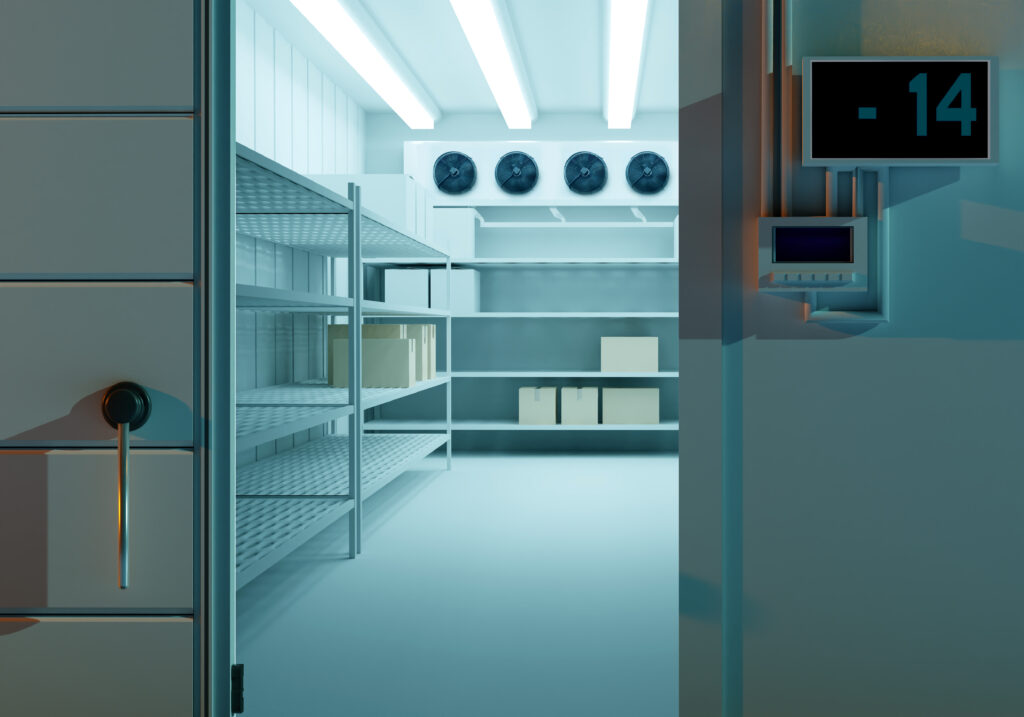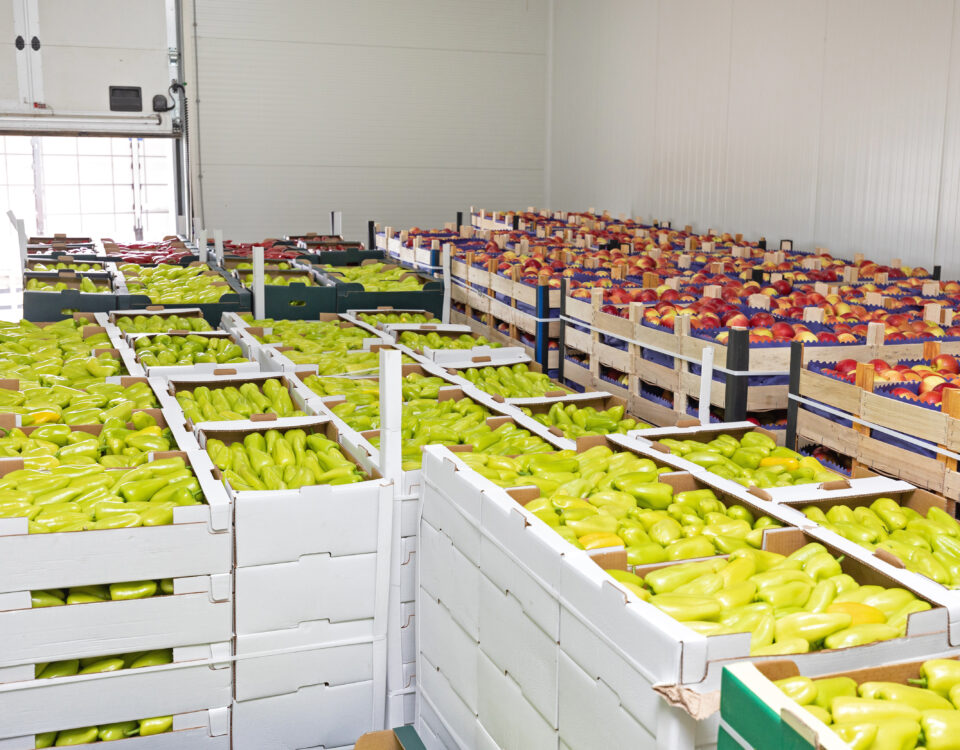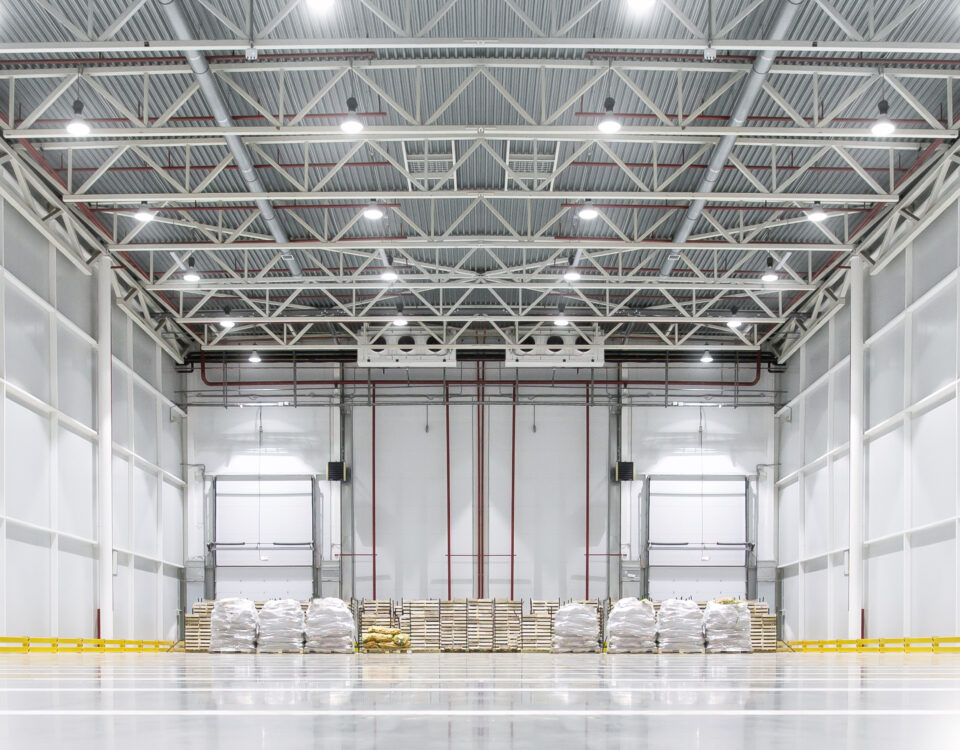The Basics of Cold Storage and Refrigerated Warehousing
Published on: October 6, 2022

Telling Signs Your Food Business May Be Ready For a Co-Packer
October 6, 2022
How to Choose a Safe Co-packer for Your Food Business
November 27, 2022Working with perishable or temperature-sensitive goods in the food industry can be challenging. Given the delicate nature of these products, you need to take extra precautions in handling, preservation, storage, and distribution. Otherwise, you risk contaminating your food products before reaching their final destination.
So if your business is struggling with this dilemma, cold storage warehousing should be a top priority. These warehouses have become more prevalent in recent years, with the cold storage market expected to grow by 9.2% annually from 2022 to 2030. So, what exactly are they, and how do they work? Check out this guide to learn more about the basics and understand how cold storage warehouses will benefit your food business.
What Is Cold Storage and Refrigerated Warehousing?
Cold storage warehousing involves storing perishable goods in a temperature-controlled facility. This facility is called a cold storage warehouse, built with advanced equipment and systems to maintain low temperatures. Generally, the controlled temperature ranges from 0 to 10°C for refrigerated items and -30 to 0°C for frozen items.
Food businesses use cold storage warehousing logistics for various products, including fruits and vegetables, meat, dairy products, and seafood. Doing so helps preserve their product’s quality and integrity so that they stay fresh during transport. In effect, your business operates more efficiently, and you reduce the likelihood of food waste.
Beyond food products, other items that require cold storage warehouses include live flowers and plants, bio-pharmaceuticals, artworks, cosmetics, and chemicals.

Benefits of Hiring a Cold Storage Warehousing Partner
Now that you understand the importance of a cold storage warehouse for a food business, the question is where to get one.
Generally, you have two options: hire a cold storage warehousing company or build the facility yourself. But in most cases, the former is more practical and economical since your expertise lies in food, not logistics. Choosing the latter will also require a heavy investment, which can cut your finances.
To help you think about this decision more carefully, check out the main benefits of hiring a cold storage warehousing partner below.
Cost Reduction
Running a cold storage warehouse is expensive. Aside from the initial investment to put up the facility, you’ll need to spend on cooling equipment, storage pallets, inventory management systems, and many other things. You can also expect the monthly utility bills to be high since the refrigerants will constantly be running to preserve your food.
On top of all these, you’ll need to hire and train staff to manage the facility and maintain your equipment. So ultimately, it’ll undoubtedly be more affordable to outsource cold storage warehousing services to a professional company. Instead of shelling out a considerable amount and paying variable costs monthly, you only need to pay a fixed amount to your partner.
Quality Assurance
Cold storage warehousing companies are logistics experts, so you can trust that they know how to handle your products and keep them in good condition. Aside from setting the optimal conditions to store your items, these professionals clean the warehouse regularly to prevent contamination and comply with strict quality standards.
Scalability
As your food business grows, so will your storage capacity needs. Fortunately, this won’t be a problem if you get cold storage and warehousing services since you can easily scale your usage. You’ll be able to store as much or as little inventory in the facility based on the circumstances—whether they be demand fluctuations or expansion plans.
Security and Monitoring
Cold storage warehousing partners have extensive security and monitoring systems in place to mitigate risk and enhance visibility. Thus, hiring one gives you peace of mind knowing that your products are safe while in storage.
Examples of Cold Storage Needs in Business
Products in the food industry go through many stages in the supply chain, from farm to processing to storage to retail. No matter where your business is in the chain, you’ll need cold warehousing storage to transport your goods safely. For more information, here are examples of cold storage needs in different types of food businesses:
Food Processors and Manufacturers
Food processors and manufacturers usually source ingredients straight from the farm. However, the moment you harvest fresh produce, they start losing nutrients. This means the longer it takes for the ingredients to go from the farm to your facility, the more their quality will degrade.
So to prevent this from happening, you can hire a cold storage warehousing company to help you transport the ingredients while retaining their nutritional value. Alternatively, you can also use a cold warehouse to store frozen or refrigerated goods before distribution. Doing this ensures that your products are still fresh when they reach the retailers.
Dairies
Like fresh produce, dairy products like milk and cheese can quickly spoil if you leave them out of the refrigerator for too long. Thus, dairies also need cold storage warehousing solutions to keep their products safe before they’re distributed.
Restaurants and Kitchens
One of the biggest problems restaurant and commercial kitchen owners face is spoilage, which happens when they have too much inventory. Cold warehouses address this concern by prolonging your ingredients’ shelf life.
Instead of keeping all your stock in-house, cold storage warehousing distribution services allow you to safely store your ingredients or products to prolong their shelf life. Some warehouse companies also offer delivery services, so you can always have a fresh supply sent to your kitchen.
Types of Cold Storage
Given the range of applications for cold storage warehousing, there are many types of cold storage designed for different needs. These include the following:
- Refrigerated Containers. Refrigerated containers store fruits, vegetables, juices, and other chilled products. They’re primarily used for smaller quantities of items and can be mobile or fixed.
- Blast Freezers and Chillers. Blast freezers and chillers are much bigger than refrigerated containers. They’re best for large manufacturers and restaurant chains that need to keep their products cool or frozen until they reach the end consumers.
- Pharmaceutical Grade Cold Storage. As suggested by its name, this type of storage is targeted toward hospitals and pharmaceutical businesses. It’s designed for sensitive products like medicine, blood, vaccines, and other biopharmaceuticals.
- Plant-Attached Cold Storage. Plant-attached cold storage is intended for businesses that want an in-house facility. In this case, you’ll build the warehouse as part of your manufacturing plant, then transfer products to the cold storage through a conveyor belt.
- Dedicated Custom Cold Storage Facilities. These dedicated facilities have advanced features to cater to more complex or specific storage needs. Building a whole warehouse yourself will be costly, so you can instead outsource a custom facility from a third-party partner.
Tips to Find a Good Cold Storage Warehouse for Your Business
Finding the right partner is essential if you’re interested in renting a cold storage warehousing distribution facility. As mentioned, there are many types of cold storage units, so you should choose a partner that best suits your needs. Here are a few tips to follow in your search:
Look for certifications
Start by asking the facility about relevant certifications to check if they comply with industry regulations and private standards. The top cold storage warehouses should be certified by accredited organizations like the American Frozen Food Institute (AFFI) and US Poultry and Egg Association (UPEA).
Choose a warehouse near your location
Generally, it’s best to find a cold storage warehouse near your location—whether it is your factory or your kitchen. This helps reduce transportation time and fuel costs to ensure you always get your ingredients when you need them.
Compare rates across companies
Naturally, the cost is always an essential consideration for any business. So before choosing any partner, take some time to compare cold storage warehousing rates across companies. But remember that the lowest-cost option isn’t necessarily the best—the goal is to find which partner can provide the most value for money, given your budget.
Ask about systems and technologies
Knowing a warehouse company’s systems and technologies gives you an idea of its logistics capabilities. Ideally, you want a partner with a proper management system so that you can monitor your inventory in real time. If possible, it’ll also be helpful if they have tracking capabilities to pinpoint where products are in the supply chain.
Join Sunleaf’ Cold Chain Program to Streamline Your Logistics
Our cold chain program offers the perfect solution if your food business needs cold storage warehousing. At Sunleaf, we use a three-pronged approach: sourcing, cold warehousing, and shipping. This way, you won’t need to worry about finding ingredients. We’ll do this for you and store the products in optimal conditions to preserve their quality until delivery.
For more information on how our program works, contact us at 949-899-6285.





